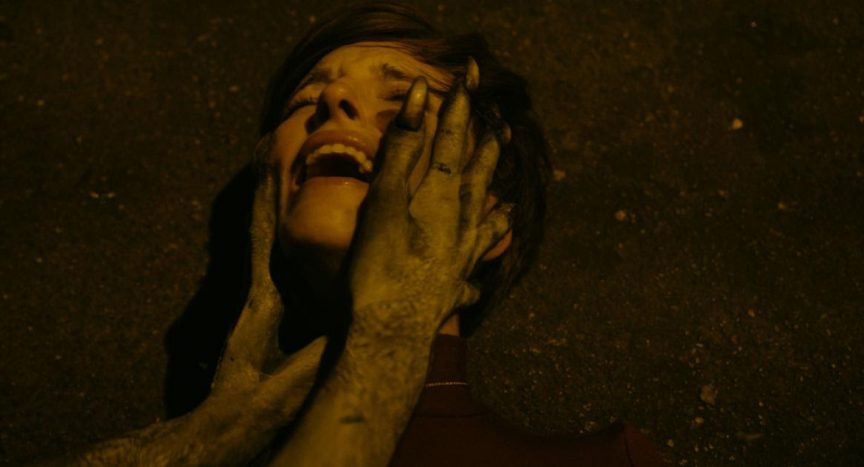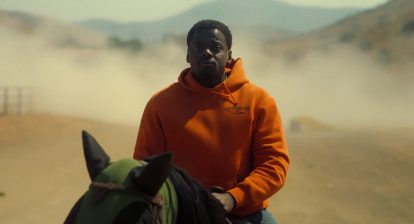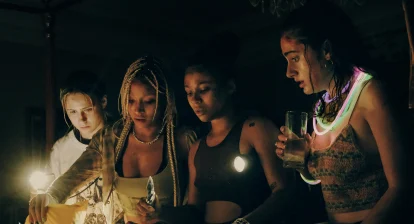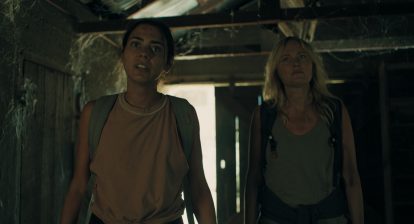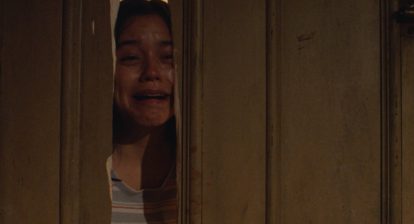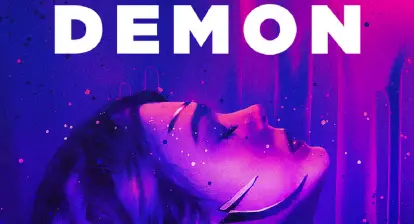One of the most frequently asked, and infuriating, questions when a woman reveals she was a victim a sexual assault, is why didn’t she speak up sooner? Or, worse yet, why didn’t she just go to the police? Judging by the increasingly damning statistics, most of us will be victims of sexual assault and/or harassment at some stage in our lives, but the sad truth is that women typically don’t speak out because, more often than not, they’re disbelieved. Take Back the Night, the impressive feature debut from director Gia Elliot, the sharp script for which she co-wrote with star and fellow producer Emma Fitzpatrick, tackles this idea head on by placing a female victim front and center and gradually picking apart the particulars of her horrifying story.
See Also: I Am Lisa is Impressively Female-Focused [Review]
Fitzpatrick is artist Jane Doe – likely purposely named because so many sexual assault victims remain anonymous out of fear of retaliation from both the perpetrator and the public at large – who’s attacked while walking home late one night. Jane’s assailant is this kind of strange smoke monster thing, with dirty black hands. The attacker is fuzzily presented, as though it’s more of an idea than a physical being, arguably as a metaphor for how tough it is to recall traumatic incidents while filling in the blanks for law enforcement. Jane’s wounds, which, thanks to impressive makeup work look super gross and painful, should be evidence enough but naturally the cops won’t simply take her word for it, not least because she’s got a history of habitual drug use and mental illness.
By centering an imperfect victim, Take Back the Night makes an incisive point about how much of the heavy lifting women are expected to do just to be believed. As Jane rails at one point, what does it matter who she is or what’s she done in her life? Surely all that matters is that she was attacked, and the perpetrator is still at large? Muddying the waters further, Jane is also a popular online influencer and, by speaking out about her experience, she could be helping or hindering her case depending on your outlook. Her sister (empathetically played by Angela Gulner) clearly thinks it’s a bad idea, preferring to trust the powers that be rather than taking matters into her own hands. As Jane’s case continues to hit roadblocks, however, it becomes clear that might be the only option.

Take Back the Night makes its intentions clear right in the film’s opening moments, by overlaying audio from an invasive police interview on top of footage of a distraught Jane making her way through a train station, in an attempt to take her own life. Much of the movie is captured through handheld cameras, which makes each moment feel more urgent and rawer. True, it’s rough around the edges – the audio mix and lighting are both noticeably dodgy at times – but the performances – from an all-female cast, including perhaps the first queer lady cop in a movie in recent memory – shine through and, crucially, Elliot and Fitzpatrick’s message is never lost. Elliot tackled the cinematography herself and she does a stellar job composing resonant images that look far better than the film’s low budget constraints would often allow.
The crew, too, is predominantly female, so there’s no danger of any #NotAllMen arguments seeping into the narrative. Moreover, prior to being attacked, Jane has consensual, drunken sex in the bathroom at her art show, instantly striking down the idea that for an assault victim to be genuine she must also be a virgin with no prior sexual history. Likewise, Jane’s super cool fringe dress, in which she was assaulted, is repurposed later for a TV interview during which Jane is laid bare in a completely different way, signifying how women’s clothing is all too often used against us to justify the actions of bad men. For years, campaigners have argued that it doesn’t matter how we’re dressed, and the filmmakers poke a hole in that idea and then rummage around in the wound.
Take Back the Night is interested, first and foremost, in the horror of the (in)justice system, which is what ultimately leads Jane on a violent course of vigilante retribution. Although the ending reads a little more outlandish than everything that’s come before, it’s also the only moment a bit of lightness is allowed edge into the story, as Jane and her sister joke around about Twinkies. The film is quite dour otherwise, and it finishes with the requisite helplines, rightly so, but if there were more quippiness to it, the central message wouldn’t hit as hard. Besides, Elliot is right to make us uncomfortable rather than give the audience a pass at having a little laugh here and there. Jane may be dealing with a literal monster, but in real life the villains are unavoidably human.
Did You Know? Wicked Horror TV Has Classic and Independent Horror Films Available to Stream for Free!

The physical elements to Jane’s assailant are impressive, and the effect is pretty cool, a few wobbles with the performer and her costume (the unseen actor is also a woman, naturally) aside. At one point while Jane is being interviewed, those creepy black hands reach through the ether and try to grab her. It’s a technique Elliot should’ve employed more liberally throughout Take Back the Night, because aside from being a nifty visual representation of Jane’s fears, it’s also a handy method of showcasing the emotional constraints of trying, and typically failing, to bring your attacker to justice. As frustrating as it is to watch Jane go through all this, her struggle is undeniably realistic, even with another woman on the other side of the table clearly empathizing with her struggle.
See Also: Brea Grant Thinks It’s Time Older Women’s Stories Were Told [Interview]
Take Back the Night announces an exciting new voice in Elliot and indeed Fitzpatrick, whose utterly committed and vanity-free performance as Jane perfectly encapsulates the tightrope women must walk in order to get justice, or even just plain old vengeance, for the wrongs committed against us. Although there are some minor technical hiccups along the way, the message rings devastatingly true throughout. For better and indeed worse, Take Back the Night is a painfully, unflinchingly honest depiction of how impossible it is simply to be believed as a victim of violence.
Catch Take Back the Night in select theaters and on Digital from March 4, 2022
WICKED RATING: 7/10
Director(s): Gia Elliot
Writer(s): Gia Elliot, Emma Fitzpatrick
Stars: Emma Fitzpatrick, Angela Gulner, Jennifer Lafleur
Release date: March 4, 2022
Language: English
Run Time: 90 minutes
